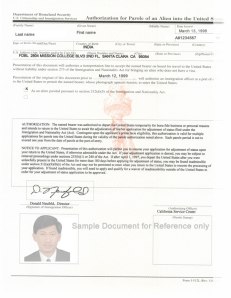
The President’s executive reforms to the U.S. immigration system make a number of very positive changes that have the potential to help millions of people. Although we have written about various components of the reforms individually, we have summarized six major portions here in one place.
Benach Ragland will be offering several free community meetings throughout December and will be offering reduced fee consultations for people who may benefit from these reforms. To get the latest information about where we will be, please “like” us on Facebook and follow us on Twitter: @benachragland. To schedule a reduced fee consultation, please email: consult@benachragland.com or call 202-644-8600.
- Deferred Action for the Parents of U.S. Citizens and Permanent Residents
The centerpiece of the President’s immigration reforms announced yesterday is the expansion of deferred action to cover certain foreign national parents of United States citizens. Here are the details:
The U.S. Citizenship & Immigration Service will give deferred action and employment authorization to individuals who:
- As of November 20, 2014, have a son or daughter who is a United States citizen or lawful permanent resident.
- Entered the U.S. prior to January 1, 2010
- Are not in lawful status as of November 20, 2014
- Are not an enforcement priority
- Do not present other factors that weigh against a favorable exercise of discretion
People who fall within the DHS’ new enforcement priorities will be ineligible for deferred action. With a new memo issued today, N ovember 20, 2014, the DHS has revised the enforcement priorities for the agency. The new enforcement priorities are divided into three levels of priority of decreasing priority. Presumably, those not within the enforcement priorities memo are not enforcement priorities and should qualify for benefits and not be subject to efforts to seek removal. We have summarized the new enforcement priorities memo here.
ovember 20, 2014, the DHS has revised the enforcement priorities for the agency. The new enforcement priorities are divided into three levels of priority of decreasing priority. Presumably, those not within the enforcement priorities memo are not enforcement priorities and should qualify for benefits and not be subject to efforts to seek removal. We have summarized the new enforcement priorities memo here.
Applicants will be required to provide fingerprints and undergo national security and criminal background checks. The filing fee will be $465. CIS has been directed to begin accepting applications no later than 180 days from the date of the announcement (May 19, 2015). Work permits will be valid for three years and individuals granted deferred action can also seek advance parole to travel internationally.
- Expanded eligibility for Deferred Action for Childhood Arrivals (DACA)
Another significant development coming out of the Presidential reforms announced yesterday is the expansion of DACA beyond its original parameters established in 2012. For descriptions of the original DACA requirements, please see here.
The executive reforms announced yesterday make the following reforms to the DACA program:
- The date of entry for DACA eligibility has been changed from June 15, 2007 to January 1, 2010. Individuals who entered the U.S. prior to their 16th birthday and prior to January 1, 2010 can qualify for DACA under the revised guidelines.
- The age cap has been eliminated. Originally, DACA was limited to individuals under 31 years of age as of June 15, 2012. The upper age limit has been eliminated and those who entered the U.S. before January 1, 2010 and were under the age of 16 will qualify regardless of their current age.
- DACA work authorization will now be valid for three years as opposed to two.
These reforms will be implemented within 90 days. The other DACA requirements regarding education and criminal issues remain unchanged. The new parole provisions should also assist DACA grantees.
- The New Enforcement Priorities Memo
 As part of the executive actions reforms announced by the administration yesterday, the administration has redefined the enforcement priorities for Immigration & Customs Enforcement. Briefly, any law enforcement agency with limited resources can not realistically enforce the law against everyone who may have broken it. Law enforcement agencies must pick and choose how to allocate their limited resources and where to expend their efforts. The new enforcement priorities memo provides very clear guidance to ICE as to who their efforts ought to be focused upon. Groups of people have been classified into three priorities for enforcement, in declining orders of priority. Individuals not within this memo are, presumably, not priorities, and should be eligible for benefits and not subjected to enforcement actions like detention and removal. The three classes of priority are as follows:
As part of the executive actions reforms announced by the administration yesterday, the administration has redefined the enforcement priorities for Immigration & Customs Enforcement. Briefly, any law enforcement agency with limited resources can not realistically enforce the law against everyone who may have broken it. Law enforcement agencies must pick and choose how to allocate their limited resources and where to expend their efforts. The new enforcement priorities memo provides very clear guidance to ICE as to who their efforts ought to be focused upon. Groups of people have been classified into three priorities for enforcement, in declining orders of priority. Individuals not within this memo are, presumably, not priorities, and should be eligible for benefits and not subjected to enforcement actions like detention and removal. The three classes of priority are as follows:
Priority 1 (Most serious)
- individuals suspected of terrorism, espionage or who are otherwise a threat to national security
- individuals apprehended at the border while trying to enter the country illegally
- individuals involved in gangs or gang activity
- individuals convicted of a felony unless the essential element of the offense is the individual’s immigration status
- individuals convicted of an aggravated felony
Priority 2 (Medium serious)
- individuals convicted of three or more misdemeanors, not including traffic offenses or offenses where an essential element is the individual’s immigration status
- individuals convicted of a “significant misdemeanor”, which is defined as: an offense of domestic violence, sexual abuse or exploitation, burglary, unlawful possession or use of a firearm, drug trafficking or distribution, driving under the influence, or any offense not included above for which the individual was sentenced to 90 days or more in custody (unlike in most immigration situations, a suspended sentence does not count)
- those who have entered the U.S. unlawfully after January 1, 2014
- significant visa or visa waiver abusers
Priority 3 (Less serious)
- Individuals with a final order of removal entered after January 1, 2014, unless there are other factors that suggest that the individual should not be a priority for enforcement.
Once again, presumably, an individual not on any of these lists should not be considered a priority for removal and ICE is directed not to expend resources of seeking their detention and removal. We will be watching ICE to see how the agents in the field respond to these revised priorities.
- Clarifications and increased use of Advance Parole
Another positive change to the immigration laws announced last night is the Secretary of Homeland Security’s instruction that DHS counsel should prepare a legal memorandum forthcoming that departures pursuant to advance parole will not trigger the three and ten year bars. This memo is to ensure that all departures on advance parole are treated consistently across the country for unlawful presence purposes.
Individuals who have been unlawfully present in the U.S. for more than 180 days who then depart the U.S. are subject to a three year bar on returning. Individuals with a year or more of unlawful presence face a ten year bar after departure. In Matter of Arrabally and Yerabelly, 25 I.&N. Dec. 771 (BIA 2012), the Board of Immigration Appeals ruled that individuals who de parted on an advance parole granted due to a pending application for adjustment of status have not made a “departure” for purposes of triggering the three or ten year bars. while this was a welcome decision, there was confusion and disagreement whether this applied to all departures on advance parole or only to those who departed on advance parole issued to applicants for adjustment of status. For example, DACA recipients can get advance parole and it was unclear whether their departure would subject them to a bar to return due to unlawful presence they may have accrued prior to DACA’s existence.
parted on an advance parole granted due to a pending application for adjustment of status have not made a “departure” for purposes of triggering the three or ten year bars. while this was a welcome decision, there was confusion and disagreement whether this applied to all departures on advance parole or only to those who departed on advance parole issued to applicants for adjustment of status. For example, DACA recipients can get advance parole and it was unclear whether their departure would subject them to a bar to return due to unlawful presence they may have accrued prior to DACA’s existence.
The new memo is to clarify that any departure from the U.S. under advance parole no matter why that parole was granted would not be considered a departure for purposes of triggering the three and ten year bars. This means that people with advance parole, perhaps as a result of DACA, or through the new “DAP” program, for parents of U.S. citizens, will be able travel to visit family abroad without having to lose everything they have achieved in the U.S.
- Expansion of the Provisional Waiver
Another positive development is the proposed expansion of the provisional waiver program, which the President initiated in 2013. The provisional waiver, as initially introduced allowed the spouses and children of U.S. citizens to seek a waiver of inadmissibility for the three and ten year bars due to unlawful presence to seek a waiver in the U.S. rather than after proceeding abroad to seek a visa at a U.S. consulate abroad. This program has been successful and we have had several provisional waivers approved and been lucky to witness reunions made possible by the provisional waiver.
The provisional waiver was initially limited only to spouses and children of American citizens. The new memo instructs CIS to “expand access to the provisional waiver to all statutorily eligible classes of relative for whom an immigrant visa is immediately available.” This will clearly include the spouses and children of permanent residents, but could also potentially include a larger group of individuals such as the adult sons and daughters of U.S. citizens.
Also, for tremendous significance, the Secretary of Homeland Security has directed the CIS to “clarify the factors that are considered by adjudicators in determining whether the “extreme hardship” standard has been met. Most importantly, the Secretary has directed CIS to consider whether a legal presumption of extreme hardship may be determined to exist. The creation of the presumption of hardship would reduce the burden on applicants seeking to show extreme hardship. We particularly love this idea, because we suggested it here while pointing out the legal authority for such a move.
- Parole in Place for family members of those seeking to enlist in the military
The package of reforms introduced by the President includes new policies on the U.S. of parole-in-place or deferred action for the family members of those seeking to enlist in the military.
Parole in place is a function of the Department’s discretionary authority to parole anyone into the U.S. Parole in place is a mechanism to allow the Secretary of Homeland Security to parole an individual into the U.S., providing that individual with legal status and the ability to seek adjustment of status. Recently, the government has used parole in place to allow the undocumented spouses, parents and children of Servicemembers, including Veterans, to adjust status. We discussed this process here in August.
The new policy builds on this use of parole in place. The Secretary of Homeland Security has instructed the CIS to work with the Department of Defense to “address the availability of parole in place and deferred action to the spouse, parent or child of a U.S. citizen or resident who seeks to enlist in the armed forces.
The “seeks to enlist” criteria is a major expansion of this authority and may provide residence to the close family members of those who want to join the military.
These reforms present many exciting opportunities for immigrants. In connection with other parts of the law, it may be possible to achieve more than a work permit. We are excited about the possibilities for so many immigrants and look forward to the chance to serve you.
Tags: DACA, DAPA, de Osorio, executive action, Extreme hardship waiver, I601A, immigration reform, parents of citizens, provisional waiver
 provisional waiver is approved, the NVC reverts to its standard practice of being an impediment, rather than a facilitator of orderly processing of immigrant visas. For example, one challenge we have seen relates to police clearances from El Salvador. According to the State Department, those police certificates must be obtained by the applicant in person in El Salvador. That’s fine, except for the case of provisional waivers, where the applicant is in the U.S. Since the NVC will not schedule an appointment until it has all the documents, this issue could force an applicant to return to El Salvador and wait several months for an interview, undermining the benefit of certainty that the provisional waiver is supposed to provide. We are working on this specific issue and will update this blog as circumstances merit.
provisional waiver is approved, the NVC reverts to its standard practice of being an impediment, rather than a facilitator of orderly processing of immigrant visas. For example, one challenge we have seen relates to police clearances from El Salvador. According to the State Department, those police certificates must be obtained by the applicant in person in El Salvador. That’s fine, except for the case of provisional waivers, where the applicant is in the U.S. Since the NVC will not schedule an appointment until it has all the documents, this issue could force an applicant to return to El Salvador and wait several months for an interview, undermining the benefit of certainty that the provisional waiver is supposed to provide. We are working on this specific issue and will update this blog as circumstances merit.









